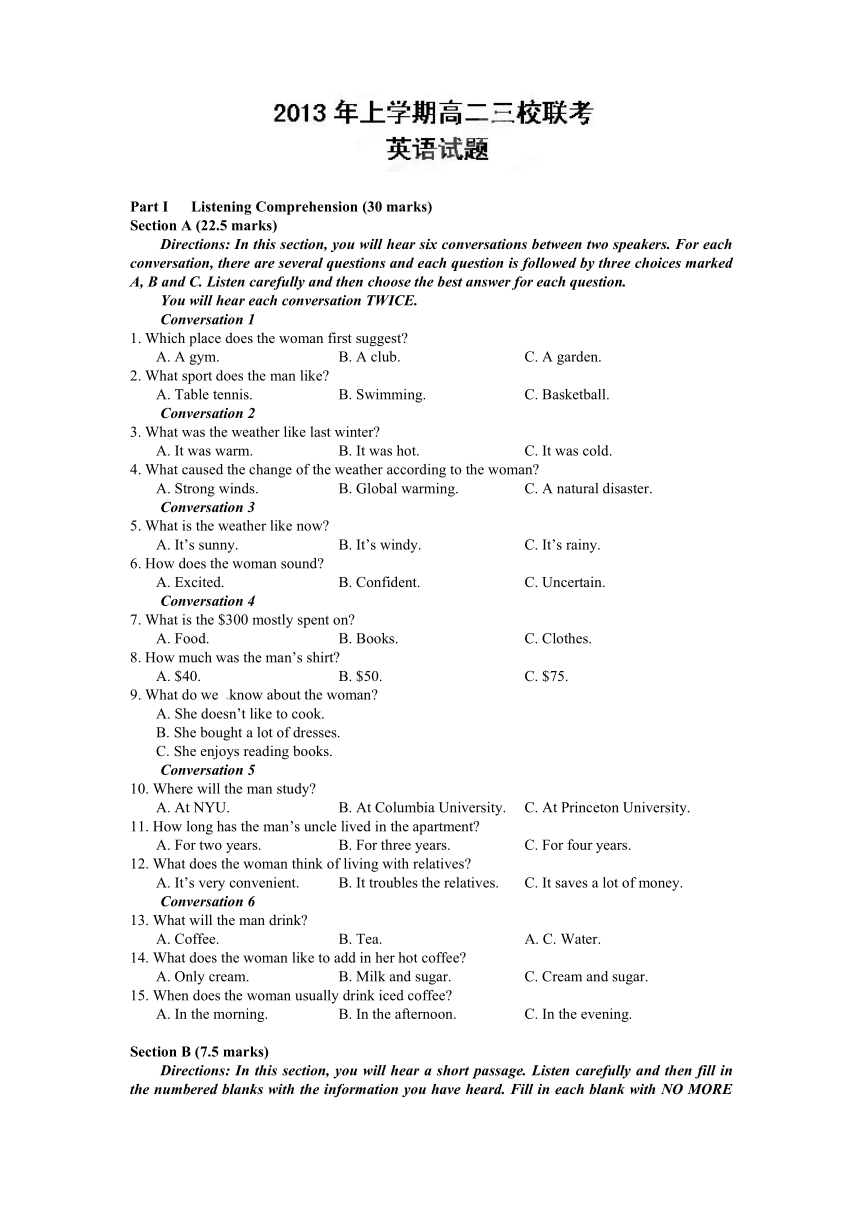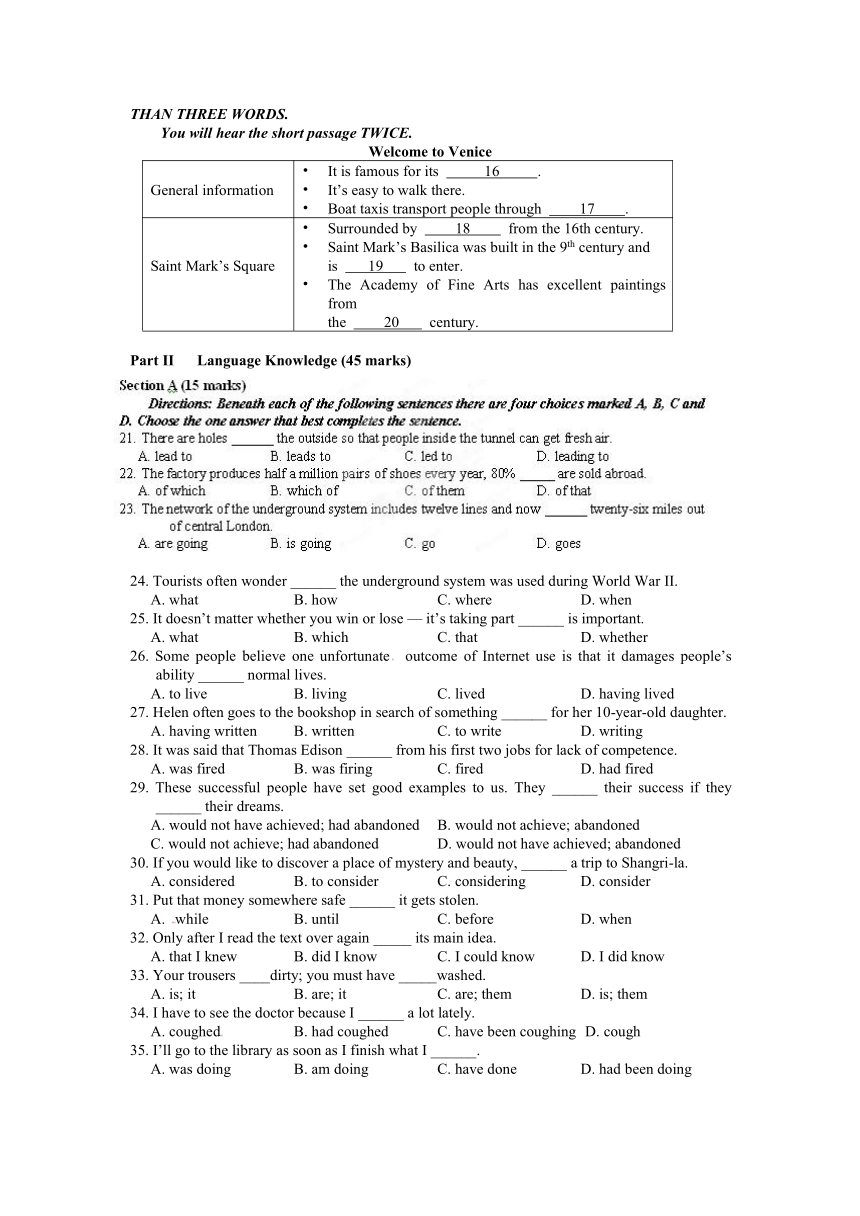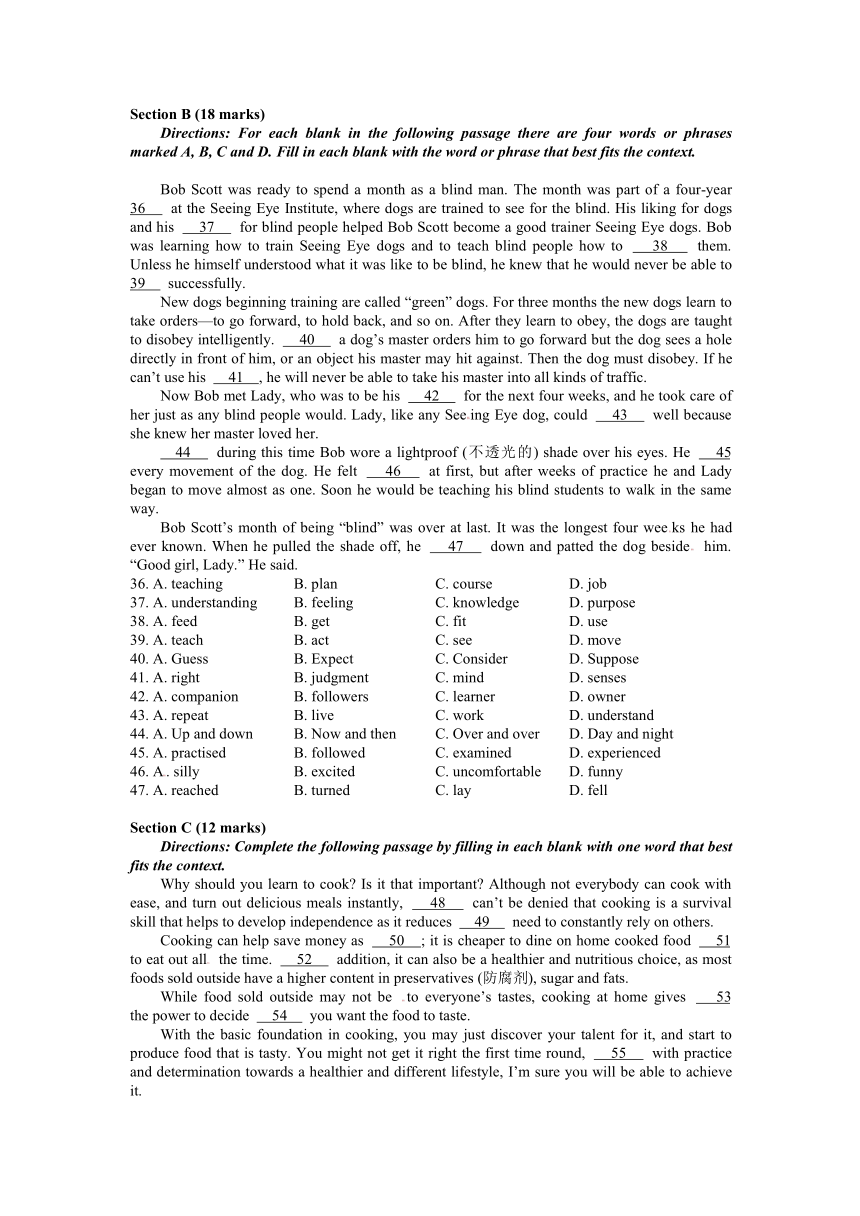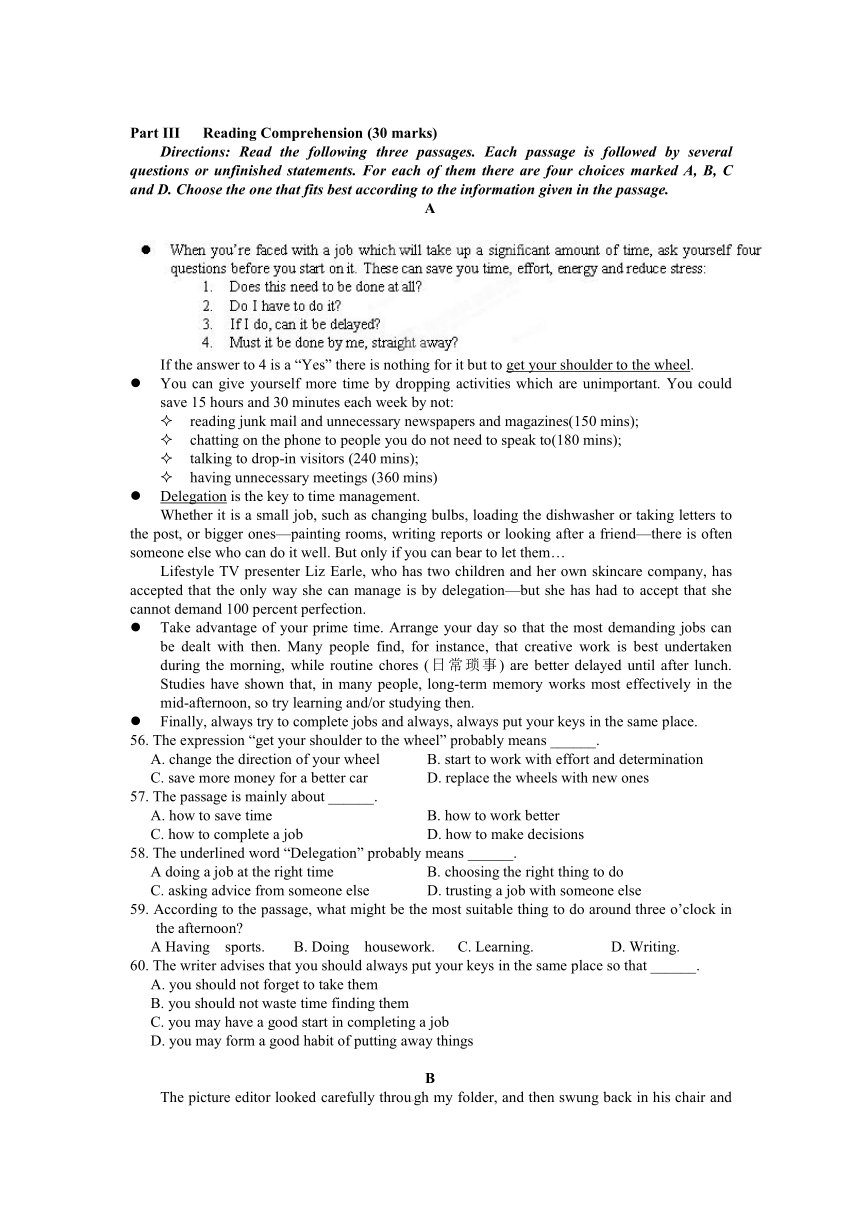湖南省桃江县第一中学等三校2012-2013学年高二7月联考英语试题(无答案)
文档属性
| 名称 | 湖南省桃江县第一中学等三校2012-2013学年高二7月联考英语试题(无答案) |  | |
| 格式 | zip | ||
| 文件大小 | 81.6KB | ||
| 资源类型 | 教案 | ||
| 版本资源 | 牛津译林版 | ||
| 科目 | 英语 | ||
| 更新时间 | 2013-08-28 06:17:44 | ||
图片预览




文档简介
Part I Listening Comprehension (30 marks)
Section A (22.5 marks)
Directions: In this section, you will hear six conversations between two speakers. For each conversation, there are several questions and each question is followed by three choices marked A, B and C. Listen carefully and then choose the best answer for each question.
You will hear each conversation TWICE.
Conversation 1
1. Which place does the woman first suggest?
A. A gym. B. A club. C. A garden.
2. What sport does the man like?
A. Table tennis. B. Swimming. C. Basketball.
Conversation 2
3. What was the weather like last winter?
A. It was warm. B. It was hot. C. It was cold.
4. What caused the change of the weather according to the woman?
A. Strong winds. B. Global warming. C. A natural disaster.
Conversation 3
5. What is the weather like now?
A. It’s sunny. B. It’s windy. C. It’s rainy.
6. How does the woman sound?
A. Excited. B. Confident. C. Uncertain.
Conversation 4
7. What is the $300 mostly spent on?
A. Food. B. Books. C. Clothes.
8. How much was the man’s shirt?
A. $40. B. $50. C. $75.
9. What do we know about the woman?
A. She doesn’t like to cook.
B. She bought a lot of dresses.
C. She enjoys reading books.
Conversation 5
10. Where will the man study?
A. At NYU. B. At Columbia University. C. At Princeton University.
11. How long has the man’s uncle lived in the apartment?
A. For two years. B. For three years. C. For four years.
12. What does the woman think of living with relatives?
A. It’s very convenient. B. It troubles the relatives. C. It saves a lot of money.
Conversation 6
13. What will the man drink?
A. Coffee. B. Tea. A. C. Water.
14. What does the woman like to add in her hot coffee?
A. Only cream. B. Milk and sugar. C. Cream and sugar.
15. When does the woman usually drink iced coffee?
A. In the morning. B. In the afternoon. C. In the evening.
Section B (7.5 marks)
Directions: In this section, you will hear a short passage. Listen carefully and then fill in the numbered blanks with the information you have heard. Fill in each blank with NO MORE THAN THREE WORDS.
You will hear the short passage TWICE.
Welcome to Venice
General information
It is famous for its 16 .
It’s easy to walk there.
Boat taxis transport people through 17 .
Saint Mark’s Square
Surrounded by 18 from the 16th century.
Saint Mark’s Basilica was built in the 9th century and is 19 to enter.
The Academy of Fine Arts has excellent paintings from the 20 century.
Part II Language Knowledge (45 marks)
24. Tourists often wonder ______ the underground system was used during World War II.
A. what B. how C. where D. when
25. It doesn’t matter whether you win or lose — it’s taking part ______ is important.
A. what B. which C. that D. whether
26. Some people believe one unfortunate outcome of Internet use is that it damages people’s ability ______ normal lives.
A. to live B. living C. lived D. having lived
27. Helen often goes to the bookshop in search of something ______ for her 10-year-old daughter.
A. having written B. written C. to write D. writing
28. It was said that Thomas Edison ______ from his first two jobs for lack of competence.
A. was fired B. was firing C. fired D. had fired
29. These successful people have set good examples to us. They ______ their success if they ______ their dreams.
A. would not have achieved; had abandoned B. would not achieve; abandoned
C. would not achieve; had abandoned D. would not have achieved; abandoned
30. If you would like to discover a place of mystery and beauty, ______ a trip to Shangri-la.
A. considered B. to consider C. considering D. consider
31. Put that money somewhere safe ______ it gets stolen.
A. while B. until C. before D. when
32. Only after I read the text over again _____ its main idea.
A. that I knew B. did I know C. I could know D. I did know
33. Your trousers ____dirty; you must have _____washed.
A. is; it B. are; it C. are; them D. is; them
34. I have to see the doctor because I ______ a lot lately.
A. coughed B. had coughed C. have been coughing D. cough
35. I’ll go to the library as soon as I finish what I ______.
A. was doing B. am doing C. have done D. had been doing
Section B (18 marks)
Directions: For each blank in the following passage there are four words or phrases marked A, B, C and D. Fill in each blank with the word or phrase that best fits the context.
Bob Scott was ready to spend a month as a blind man. The month was part of a four-year 36 at the Seeing Eye Institute, where dogs are trained to see for the blind. His liking for dogs and his 37 for blind people helped Bob Scott become a good trainer Seeing Eye dogs. Bob was learning how to train Seeing Eye dogs and to teach blind people how to 38 them. Unless he himself understood what it was like to be blind, he knew that he would never be able to 39 successfully.
New dogs beginning training are called “green” dogs. For three months the new dogs learn to take orders—to go forward, to hold back, and so on. After they learn to obey, the dogs are taught to disobey intelligently. 40 a dog’s master orders him to go forward but the dog sees a hole directly in front of him, or an object his master may hit against. Then the dog must disobey. If he can’t use his 41 , he will never be able to take his master into all kinds of traffic.
Now Bob met Lady, who was to be his 42 for the next four weeks, and he took care of her just as any blind people would. Lady, like any Seeing Eye dog, could 43 well because she knew her master loved her.
44 during this time Bob wore a lightproof (不透光的) shade over his eyes. He 45 every movement of the dog. He felt 46 at first, but after weeks of practice he and Lady began to move almost as one. Soon he would be teaching his blind students to walk in the same way.
Bob Scott’s month of being “blind” was over at last. It was the longest four weeks he had ever known. When he pulled the shade off, he 47 down and patted the dog beside him. “Good girl, Lady.” He said.
36. A. teaching B. plan C. course D. job
37. A. understanding B. feeling C. knowledge D. purpose
38. A. feed B. get C. fit D. use
39. A. teach B. act C. see D. move
40. A. Guess B. Expect C. Consider D. Suppose
41. A. right B. judgment C. mind D. senses
42. A. companion B. followers C. learner D. owner
43. A. repeat B. live C. work D. understand
44. A. Up and down B. Now and then C. Over and over D. Day and night
45. A. practised B. followed C. examined D. experienced
46. A. silly B. excited C. uncomfortable D. funny
47. A. reached B. turned C. lay D. fell
Section C (12 marks)
Directions: Complete the following passage by filling in each blank with one word that best fits the context.
Why should you learn to cook? Is it that important? Although not everybody can cook with ease, and turn out delicious meals instantly, 48 can’t be denied that cooking is a survival skill that helps to develop independence as it reduces 49 need to constantly rely on others.
Cooking can help save money as 50 ; it is cheaper to dine on home cooked food 51 to eat out all the time. 52 addition, it can also be a healthier and nutritious choice, as most foods sold outside have a higher content in preservatives (防腐剂), sugar and fats.
While food sold outside may not be to everyone’s tastes, cooking at home gives 53 the power to decide 54 you want the food to taste.
With the basic foundation in cooking, you may just discover your talent for it, and start to produce food that is tasty. You might not get it right the first time round, 55 with practice and determination towards a healthier and different lifestyle, I’m sure you will be able to achieve it.
Part III Reading Comprehension (30 marks)
Directions: Read the following three passages. Each passage is followed by several questions or unfinished statements. For each of them there are four choices marked A, B, C and D. Choose the one that fits best according to the information given in the passage.
A
If the answer to 4 is a “Yes” there is nothing for it but to get your shoulder to the wheel.
You can give yourself more time by dropping activities which are unimportant. You could save 15 hours and 30 minutes each week by not:
reading junk mail and unnecessary newspapers and magazines(150 mins);
chatting on the phone to people you do not need to speak to(180 mins);
talking to drop-in visitors (240 mins);
having unnecessary meetings (360 mins)
Delegation is the key to time management.
Whether it is a small job, such as changing bulbs, loading the dishwasher or taking letters to the post, or bigger ones—painting rooms, writing reports or looking after a friend—there is often someone else who can do it well. But only if you can bear to let them…
Lifestyle TV presenter Liz Earle, who has two children and her own skincare company, has accepted that the only way she can manage is by delegation—but she has had to accept that she cannot demand 100 percent perfection.
Take advantage of your prime time. Arrange your day so that the most demanding jobs can be dealt with then. Many people find, for instance, that creative work is best undertaken during the morning, while routine chores (日常琐事) are better delayed until after lunch. Studies have shown that, in many people, long-term memory works most effectively in the mid-afternoon, so try learning and/or studying then.
Finally, always try to complete jobs and always, always put your keys in the same place.
56. The expression “get your shoulder to the wheel” probably means ______.
A. change the direction of your wheel B. start to work with effort and determination
C. save more money for a better car D. replace the wheels with new ones
57. The passage is mainly about ______.
A. how to save time B. how to work better
C. how to complete a job D. how to make decisions
58. The underlined word “Delegation” probably means ______.
A doing a job at the right time B. choosing the right thing to do
C. asking advice from someone else D. trusting a job with someone else
59. According to the passage, what might be the most suitable thing to do around three o’clock in the afternoon?
A Having sports. B. Doing housework. C. Learning. D. Writing.
60. The writer advises that you should always put your keys in the same place so that ______.
A. you should not forget to take them
B. you should not waste time finding them
C. you may have a good start in completing a job
D. you may form a good habit of putting away things
B
The picture editor looked carefully through my folder, and then swung back in his chair and gave me a long curious look.
“Did you take these?” he said at last. “Yes,” was all I replied.
He said, “I like this picture and I’m going to use it. Would you do some more for me?”
I left, full of excitement, with a task for more pictures.
Even as I was leaving the café in Blackstock Road, at the end of a get-together photographing the boys, I saw the familiar Wolseley waiting. As I came near, the car door opened and I heard the friendly invitation from the law.
“Get in.”
I said, “No.”
“Get in if you know what’s good for you.”
I got in. Always disobey the first time, but never take it too far. That was the game around here.
“We’ve reason to believe that you have been in that café with a stolen camera”
I told them it was not stolen. They asked to see the purchase receipt, which of course I didn’t have with me. They suggested a short drive to where I lived to find the receipt, otherwise I’d be heading straight for the police station.
“Okay,” I said, “but do me a favour—don’t park outside my house. If my mother sees you, you’ll be in terrible trouble.”
That broke them up: “So your mother is tough, eh?” But they did as I asked. I went into the house, looked through the drawers and found the receipt.
When the old lady asked what I was doing I just said that I was tidying up. When I went out to show the police they went all oily.
“Can we drop you back to where we first found you, sir?”
It was a wonderful moment, refusing a policeman’s favour and seeing them off. And of course I really had been of assistance to the law. If my mother had come across them causing me trouble, there is no question, she would have got very angry and possibly violent.
61. At first the writer refused to get in the car because ______.
A. he knew he had done nothing wrong B. he felt he would be in danger
C. he didn’t know who the men were D. he was afraid he would be taken too far
62. What can be inferred about the picture editor, the boys and the camera?
A. They had nothing to do with each other. B. The camera was actually stolen by the boys.
C. The camera belonged to the picture editor. D. The picture editor worked with the boys.
C
Fever has usually been regarded as a threat to health. However, no one has actually proved that fever is dangerous. This fact attracted the attention of Matthew J. Kluger. Imagining that fever might not be as harmful as it had been supposed, Kluger set up a series of experiments with lizards (蜥蜴).
What Kluger and his team did in their first experiment was simple. They put some lizards in a sand-box, one end of which was heated to 44?C, while the other was at a room temperature. It was found that the lizards moved from one part of the box to the other in order to keep a constant temperature of about 38°C. Having shown that normal lizards regulate (调节) their own temperature, Kluger, in a second experiment, then set out to show that lizards, like most other animals, develop fever when infected (感染). This was done by making lizards infected with bacteria (细菌) that were known to cause disease. As the team expected, the infected lizards remained longer in the heated part of the box, until they had raised their body temperatures to two or three degrees above normal. In other words, the sick lizards gave themselves fever.
In a third experiment, the team observed the effect of temperature on the survival of the lizards. One group of infected lizards was given a fever-suppressing (退烧) drug. The other group was given no drug and ran a fever, that is to say, they kept a higher temperature for four or five days before seeking a cooler environment. The results were impressive. Of those which raised their body temperature, all but one remained alive. Of those given the fever-suppressing drug, more than half died. Similar results have since been produced in other animals. For example, infected fish swim to warmer water, and will die if not allowed to do so.
An important conclusion can be drawn from these experiments. As Kluger points out, lizards have been on earth for hundreds of millions of years. It is reasonable to suppose that a response that is so old has been kept by nature for some purpose. It would appear, therefore, that fever does not make disease worse. Rather it is part of the mechanism (机能) by which infection is controlled.
66. In his experiments, Kluger was hoping to prove that fever ______.
A. is not harmful to lizards B. is necessary for both humans and animals
C. is not necessarily bad D. has the same effect on humans and animals
67. The lizards put in the sand-box in the first experiment ______.
A. had a fever B. recovered from disease
C. died of heat D. were not sick
68. In the third experiment, the lizards given a fever-suppressing drug died because ______.
A. they had no more fever that they needed B. they were normal ones and had no fever
C. the drug had no effect on sick lizards D. the drug made their body temperature too low
69. How would you understand the underlined words “a response” in the last paragraph?
A. Recovery from disease B. Natural defense in the body against disease.
C. Cause of disease. D. Relationship between living things and nature.
70. Which of the following is the best summary of this article?
A. Lizards are most suitable for experiments on fever.
B. Fever may play an important part in curing disease.
C. Fever helps lizards to get rid of infection.
D. Lizards and humans are not as different as people supposed.
Part IV Writing (45 marks)
Section A (10 marks)
Directions: Read the following passage. Fill in the numbered blanks by using the information from the passage.
Write NO MORE THAN THREE WORDS for each answer.
The history of Mother’s Day is pretty interesting. An early form of the idea may have originated in 17th century England as “Mothering Sunday”, on which the servants, who generally lived with their employers, were encouraged to return home and honor their mothers. A special cake, called the mothering cake, was often brought along to provide a festive touch.
Mother’s Day, first suggested in 1872, is linked to the anti-war efforts of Julia Ward Howe. She hoped a day set aside to honor mothers would be a way to promote peace. In 1907 a woman by the name of Anna Jarvis took Howe’s idea a step further and began a campaign for a nationally recognized Mother’s Day.
After considerable effort, Anna Jarvis finally saw her dream realized. On May 9, 1914, President Woodrow Wilson made the official proclamation (宣布) that Mother’s Day would be an annual holiday on the second Sunday in May. And so it is to this day.
In reality, mothering is complicated. We might wish that every family had an ideal balance of motherly and fatherly love, but that is simply not the case. There are many different ways that mothering happens.
For those whose lives have been shaped and nurtured by loving moms, the day is a wonderful opportunity to say thank you. Unfortunately not everyone’s experience of family life evokes (唤起) gratitude. In the complicated maze of human existence, not all mother/child relationships are positive. Evoking the image of Mom for some can be an invitation down a painful memory lane.
There is also the reality that not all mothering figures are actually mothers. Hundreds of thousands of not millions of children have been raised by foster moms (养母) who never had children of their own, but who gave maternal (似母亲的) love to children that needed them.
Mother’s Day is for all types of families. We may as well celebrate the ups and downs of our common life. For those whose childhood evokes praise and thanksgiving, let us give thanks. But for those whose childhood was marked by fear and loss, then let us offer healing. In our world, there is no reason why all experiences of family life, good and bad, cannot be included.
Title: 71
I. 72
73
Practice: servants returning home and honoring their mothers with 74
Mother’s Day
Purposes: to promote peace
to found a 75
76 : president’s proclamation of Mother’s Day
II. Reality
Types of mothering
Loving mothers: shaping and nurturing 77
78 : leaving a painful memory
Foster mothers: giving maternal love to children
III. 79
Childhood evoking praise and thanksgiving: giving thanks
Childhood marked by fear and loss: 80
Section B (10 marks)
Directions: Read the following passage; answer the questions according to the information given in the passage.
A police officer in Oregon pursuing a speeding driver was stopped in his tracks by a mother duck and her ducklings.
The officer, Mark James, with the Portland Police Department, caught a vehicle going 52 mph in a 35 mph zone.
Dashcam video on Officer James’ police cruiser shows him pulling around the corner to go after the traffic violator (违章者). After a short ride down the road on a rainy day, however, a mother duck and her two ducklings ruined his plans by walking right into the path of his cruiser (巡逻车).
Instead of driving around the ducks to keep after the speeding driver, Officer James stopped his car, walked out in the rain and followed behind the ducks until he was sure they had made it safely to the side of the road and away from traffic.
“The duck family was safely escorted to water in a ditch (沟渠) and swam away,” the police department states in a video of the incident posted to YouTube.
Officer James, who could not be reached today by our reporters, can be seen giving a shoulder shrug as he returned to his cruiser.
“The traffic violator swam away too,” the department notes at the video’s end.
81. Where did the story happen?
(≤5words) (2 marks)
________________________________________________________________________________
82. Why did the police officer stop his car and walk out?
(≤8words) (2 marks)
________________________________________________________________________________
83. Why did Officer James give a shoulder shrug as he returned to his cruiser?
(≤15words) (3 marks)
________________________________________________________________________________
84. How do reporters know so exactly about what happened to the police officer and the ducks?
(≤10 words) (3 marks)
________________________________________________________________________________
Section C (25 marks)
Directions: Write an English composition according to the instructions given below in Chinese.
请以“My favorite Book”为题,用英语写一篇短文,介绍你所读过的一本书,内容包括:
该书的内容简介;
该书对你的影响。
要求: 1. 词数不少于120个;
2. 叙述清楚,语句通顺,语意连贯;
3. 不得出现真实姓名和校名。
同课章节目录
